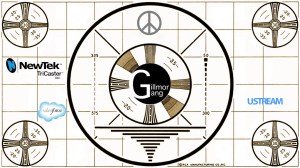For the past several months or so, I’ve been writing an accompanying post to editions of the Gillmor Gang. Due to production issues, I’m usually at least a week behind the recording session for the target show. This originally seemed like an impediment to the process of enhancing the impact of the show, but over time and various attempts to solve the out-of-sync timing problem, I began to see the delay actually produced some interesting context to the original recording. First and foremost, what seemed important weeks earlier became more nuanced as things developed — or often didn’t. Politics seemed loud and unprecedented in the moment; 10 days later, the ups and downs of the graph smoothed out the drama and accentuated the relative stability of intuitive analysis.
This in turn isolated some of the conflicts and pressure the media perceived as central to its ability to fund journalism, or more accurately nonfictional novelistic engagement and eyeball maintenance. And produced a wave of antagonism toward this repetitive ginned-up sawtooth of anger and despair. As the vaccines began to take root, we slowly but surely confirmed that we really didn’t have to live that way. Streaming and notifications are now in the process of moving into the mainstream, with media companies climbing into bed with tech giants and hybrid venture catalysts.
Cracks in this new infrastructure threaten to slow down the requisite belief that these changes will stick. Clubhouse seems to be going through a bloating effect on its gateway page; what once was a short list of 5 or 6 rooms now balloons to 20 or more entries. Topics, never my favorite mechanism for discovery, nail many of these conversations to the wall and move away from the underlying name intersections that suggest emergent themes rather than sandblasting them into the stage. Release notes of updates suggest the analytics are being mined for improvements to the differentiation with vanilla podcasts, but how they are surfaced is time sensitive to the momentum of the platform. The good news is that healthy injections from the founder and venture team will keep things afloat while we see the impact of the Android client. Competitive pressure, particularly from Kara Swisher on Twitter Spaces, will also help integrate mainstream and newsletter media with streaming audio innovation.
At a broader level, acquisitions and merger/alliances are recasting media companies as hybrid gorillas. Although AT&T is positioned by many as backing out of their foray into content, a more interesting dynamic is the combination of WarnerMedia scripted assets with Discovery’s sports and reality programming in an ad-supported streaming bundle. It’s reminiscent of the formation of MGM in the early days of Hollywood, blending a small beleaguered studio, Metro Pictures, with Sam Goldwyn’s independent near-bankrupt studio, firing Goldwyn but keeping the name, and installing a third studio’s Louis B. Mayer and his production head Irving Thalberg as executives of the bundled company. Not so coincidentally, it was Metro-Goldwyn-Mayer who was acquired by Amazon a few days later, bringing its library of the James Bond franchise, more than 4,000 classic films, and 17, 000 television properties to Prime’s 175 million active subscribers.
At various times, MGM and its United Artists acquisition have been bought and resold as power switched first from theaters to television and then to cable. Ted Turner famously bought the library and played it off on its Turner Classic Movies channel. Now the pandemic’s call to action has propelled digital transformation to the fore, and tossed yet another mix of the puzzle pieces into play. But MGM’s collapse in the 60’s and 70’s and the auctioning off of its backlot to real estate developers suggests something similar might be happening today with broadcast television networks losing out one by one when the music stops playing in this corporate game of musical chairs. Cable news may be blocked out if antitrust regulators refuse attempts to merge the new Warners Discovery with Comcast, the former now home for CNN and the latter MSNBC. Regulators will likely frown on two of the remaining 3 broadcast networks merging with a Viacom/CBS and Comcast /NBC/Universal deal.
Instead, the tech networks and their burgeoning social audio/newsletter platforms will virtualize the big studio model. Cable news will move from podcasts through Clubhouse and Spaces to newsletter brands, building tentpole events around technology news, innovations coverage, and startup deal flow. The scale of big incumbents like Netflix, Disney, and Amazon will produce 5,000+ executive interviews, with independent analysis from break-away blogs and newsletters looking a lot like a merger of MSNBC and CNBC. Apple and Spotify will emulate the ad-supported free tiers of their streaming networks to unbundle the music companies from their captive back catalogues and create a hybrid live performance promotional Top Forty for the play-from-anywhere crowd. The Marvel, DC, Star Wars cinematic universes will use the digital tier to promote theatrical experiences as the pandemic moves overseas and hopefully is suppressed globally over 2022. Politics, a trailing indicator, will be the arbiter of how quickly we can rearchitect in infrastructure, health care, and an equitable working majority rule of law. By then, maybe I can take a 3D VR trip through the MGM backlot and dream that this could be the start of a beautiful friendship.
from the Gillmor Gang Newsletter
__________________
The Gillmor Gang — Frank Radice, Michael Markman, Keith Teare, Denis Pombriant, Brent Leary and Steve Gillmor. Recorded live Friday, May 21, 2021.
Produced and directed by Tina Chase Gillmor @tinagillmor
@fradice, @mickeleh, @denispombriant, @kteare, @brentleary, @stevegillmor, @gillmorgang
Subscribe to the new Gillmor Gang Newsletter and join the backchannel here on Telegram.
The Gillmor Gang on Facebook … and here’s our sister show G3 on Facebook.

from TechCrunch https://ift.tt/3uKIan4
ConversionConversion EmoticonEmoticon